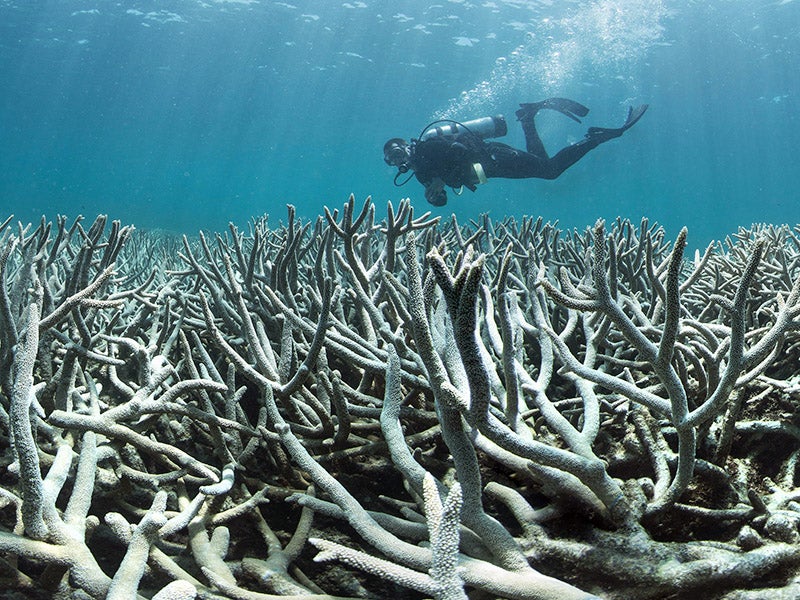Protecting coral reefs: World Heritage Committee pressures nations to take climate action
Mass coral bleaching due to rising sea temperatures is killing the Great Barrier Reef and other coral reefs around the world.

This page was published 8 years ago. Find the latest on Earthjustice’s work.
Editor’s note: This article first appeared in The Big Smoke, an Australian publication. The author, Earthjustice attorney Noni Austin, attended the recent meeting of the United Nations’ World Heritage Committee in Krakow, Poland. Says Austin: “This is the first time that the World Heritage Committee has called on countries to protect World Heritage sites by ambitiously implementing the Paris Agreement and reducing their greenhouse gas emissions. This is important because it means that countries like Australia and the United States should be taking action to address climate change to protect World Heritage sites now and into the future, for the benefit of the entire world.”
Last week, the World Heritage Committee expressed great concern about the mass coral bleaching that is killing the Great Barrier Reef and other coral reefs around the world, from Kiribati to New Caledonia to the United States.
The culprit: elevated sea temperatures caused by climate change.
But instead of protecting the Great Barrier Reef, Australia is hastening the reef’s death by failing to do all it can to reduce its emissions, in violation of its responsibility under the World Heritage Convention. Not only are Australia’s greenhouse gas emissions continuing to rise, Australia remains devoted to fossil fuels, supporting the development of coal mines such as Carmichael, the emissions from which—wherever the coal is burned—will harm the reef for decades to come.
The science is clear: coral reefs will die without a substantial global reduction in greenhouse gas emissions. In fact, a recent scientific analysis by experts at the World Heritage Committee’s secretariat and the US National Oceanic and Atmospheric Administration finds that, unless there is a substantial reduction in global greenhouse gas emissions, the Great Barrier Reef World Heritage Area will experience bleaching twice per decade by 2035 and annual bleaching by 2044. This signals the death of the reef because corals will have no opportunity to recover from bleaching events, a process that normally takes 10 to 15 years under good conditions.
This disaster is not confined to Australia. The analysis also finds that all 29 World Heritage-listed coral reefs will cease to exist as functioning ecosystems by the end of the century without substantial emissions reductions.
The death of coral reefs is an ecological disaster. Reefs provide breeding, nursery, and feeding grounds for key elements of the ocean ecosystem, and food, livelihoods, coastal protection and other benefits to around 500 million people.
We must reduce greenhouse gas emissions
But all is not yet lost. The scientific analysis confirms what other scientists have been telling us for years: if coral reefs are to survive into the future, global temperature rise must be no more than 1.5°C above pre-industrial levels. This will require an urgent and rapid reduction in global greenhouse gas emissions.
At its meeting, the World Heritage Committee called on countries to ambitiously implement the UN Framework Convention on Climate Change’s Paris Agreement, in which countries agree to pursue efforts to hold the temperature increase to 1.5°C. Although the Committee’s action is a step in the right direction, it is not enough to ensure the survival of coral reefs. Even if all countries meet their current emissions reduction targets under the Paris Agreement, temperatures will rise by about 3°C.
Obviously, Australia cannot solve the problem alone. But what are Australia’s legal and moral responsibilities as custodian of a World Heritage-listed reef that has lost up to 50 percent of its coral in less than two years?
“But all is not yet lost. The scientific analysis confirms what other scientists have been telling us for years: if coral reefs are to survive into the future, global temperature rise must be no more than 1.5°C above pre-industrial levels.”
According to the Australian government, we should be celebrating its actions to protect the Great Barrier Reef. Yet Australia’s greenhouse gas emissions continue to rise, it remains one of the world’s highest per capita emitters of greenhouse gases, and experts say it is unlikely to meet its emissions reduction targets under the Paris Agreement, targets that, in any event, are well below its fair share of necessary global reductions. Australia is also among the world’s largest producers of coal, the burning of which—anywhere on earth—fuels climate change, and the country is championing the development of massive coal mines like Carmichael, which will lock in decades of emissions that pose a real and significant threat to the reef.
If Australia were serious about protecting the reef and fulfilling its international legal responsibilities under the World Heritage Convention, it would remove its support for Carmichael and other fossil fuel developments, meet and strengthen its targets under the Paris Agreement, and engage in a rapid and just transition to renewable energy.
This would place Australia in a position of international leadership, encouraging other countries to reduce their contributions to climate change. This is how international politics works.
The world is paying attention to Australia’s failures. At the World Heritage Committee, I met representatives of many countries despairing at Australia’s inaction on climate change. In late June, the UN Committee on Economic, Cultural and Social Rights, in its periodic review of Australia’s implementation of the international treaty that protects those rights, called on Australia to take immediate measures to decrease its emissions and review its support for coal mining and export.
The Australian government’s continued support for coal and other fossil fuels at the expense of one of the world’s greatest wonders will haunt us for generations. With great reefs come great responsibilities, both legal and moral. And Australia is failing.
The International Program partners with organizations and communities around the world to establish, strengthen, and enforce national and international legal protections for the environment and public health.